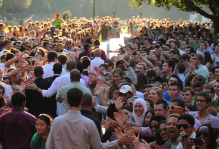W&M parents are people too.
Tomorrow, Friday, August 22, 2008 is “move-in day,” the annual rite of passage during which more than a thousand families arrive at W&M to drop off new freshmen students so that they can begin their first year of college.
When I began working at William and Mary in 1987, I was in my late twenties and was much closer in age and temperament to our undergraduates than I was to their parents. To the extent that I thought about them at all, W&M parents seemed like a bunch of overstuffed, gray-haired, 50-year olds. I use to enjoy retelling a “move-in” story I heard from one of our IT liaisons about how the stressed-out fathers of two new freshman roommates almost went at it, “mano-a-mano,” over a dispute about room decoration, as the mothers rolled their eyes at the ceiling in embarrassment and the two new freshmen looked for the nearest route of escape.
That was then, this is now. Over the past two decades, I have morphed into, well, an overstuffed, gray-haired, 50-year old. Somehow, both of my children have become college age. And I can’t drive by the countless families unloading their minivans and SUV’s on move-in day without getting a slightly nauseas, knotted feeling in the pit of my stomach.
Yeah, yeah, I know. But it’s not like we, as parents, don’t recognize that our kids can handle the new rigors of college, or that we think they are not fully capable of living away from us. For the most part we enjoy their company and will miss interacting with them every day. But based on personal experience, I know that the emotions most parents feel on move-in day aren’t primarily selfish ones.
Instead, it’s more like this. As parents, we know our kids better than anyone – certainly better than some resident assistant in a college dorm, the local student affairs staff, or professors and other classroom instructors. For eighteen years, we’ve concerned ourselves with their interests and safety, helped them get through small and big difficulties on a day-to-day basis, and generally watched their backs. What about now? If our daughter or son for some reason has difficulties or perhaps, God forbid, even falls from sight at college, will someone notice and how long will it take?
As a result of our relatively small size and the intimate operating culture at W&M, I am convinced that the answers to these questions are “yes” and “not very long.” There are many reasons, but three maybe merit special emphasis.
First, our freshmen do most of their orientation activities with other residents of their dorm hallways. Over the ensuing months, they often form lifelong friendships with other members of their freshman hallways. They may not always be fully enamored with their own roommates, but almost without fail they become close to certain other students living in nearby rooms. Often, these relationships remain at the center of their social lives for the next four years or even longer. And when W&M graduates return for alumni activities a decade or more after leaving Williamsburg, they often search first for their freshman hall mates. The freshman dorm hallways, I think, provide first-year students with strong, tightly knit, support networks that help them transition to college.
Second, in sharp contrast to larger universities, every single freshman at W&M works with an academic advisor who is a member of the faculty. For example, each year I am assigned eight to ten freshmen that have expressed some interest in government or public policy. On the Monday following move-in day, I meet with each of them individually for 30 to 45 minutes to talk about academic issues, course selection, and even possible career plans. As advisors, my faculty colleagues and I monitor the academic progress of our advisees throughout the year. Indeed, they cannot register for classes in the spring or for their sophomore years unless they meet with us beforehand to talk about course options. In my view, the advising process at W&M is a great safeguard for identifying and heading off the academic difficulties occasionally experienced by new students.
Third, pretty much across the board, the support staffs at William and Mary are just superb. Student Affairs, Career Services, the Counseling Center, Information Technology, the Writing Center, Swem Library personnel, Campus Police, the office assistants in academic departments – I could go on and on and on. Over the years, I have been amazed at the degree to which College staff in these and other offices and departments have routinely gone the extra mile to help individual W&M students stay safe and achieve their goals. On our website and in published materials, we often wax eloquent about the high quality of our faculty, academic programs, and students at W&M. But there are literally hundreds of additional College employees who together play a critical role in enhancing the welfare of all of our students, perhaps especially new freshmen.
The bottom line? Move-in day almost has to be emotionally difficult for most parents of new freshmen. But the unique size, mission, and culture of W&M should take at least some of the edge off that experience. Speaking as one overstuffed, gray-haired 50-year old to another, I really mean it.



No comments.
Comments are currently closed. Comments are closed on all posts older than one year, and for those in our archive.